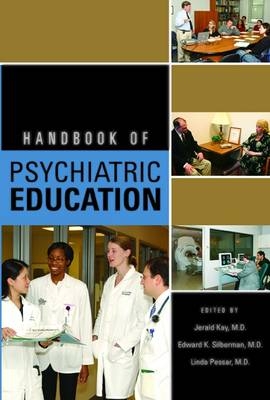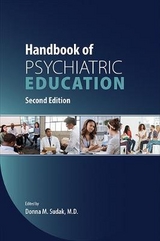
Handbook of Psychiatric Education
American Psychiatric Association Publishing (Verlag)
978-1-58562-189-7 (ISBN)
- Titel erscheint in neuer Auflage
- Artikel merken
Broad-based and comprehensive, the Handbook of Psychiatric Education covers all aspects of academic psychiatry responsibilities in teaching and education of students and residents. A concise, single-volume resource for faculty development in education, it incorporates recent innovations in teaching medical students and residents and details the newest technological tools for instruction. Its 14 chapters by 22 distinguished contributors address curriculum development and ongoing evaluation, specific teaching methods, organization and accreditation of educational programs, challenges and problems in teaching and administering graduate and undergraduate programs, role and functions of a teacher, and teaching residents how to teach.
The Handbook of Psychiatric Education, which shares many topics with the editors' 1999 Handbook of Psychiatric Education and Faculty Development addresses current trends, such as assessment methods for residency programs, the lack of researchers in psychiatry, the increase in applicants to resident psychiatry programs, and more stringent requirements for accountability in medical student education, in chapters on
• Residency "special events," including a new—and unfortunately necessary—section on dealing with disasters and terrorism
• Teaching residents how to become effective teachers, including information relevant to the medical student curriculum and the residency
• New undergraduate medical education teaching methods, including advice on determining which "reform" methods (such as problem- and case-based learning) are best suited to which types of educational goals, subject matter, and students
• The selection of undergraduate preclinical curriculum, including guidance on how to divide course offerings between nontechnical aspects of medical practice, such as the doctor-patient relationship and interviewing, and competing technical aspects, such as neuroscience, human development, and psychological theories
• New technologies in education, including discussion of the advantages and disadvantages of computer-based textbooks and clinical materials versus traditional materials and of live versus electronic teachers and addressing questions about Internet resources and required computer skills
• A wide-ranging and provocative look at the future of psychiatric education
Sure to become required reading for all psychiatry faculty, the Handbook of Psychiatric Education is also invaluable reading for psychiatry residents, medical faculty, and members of the Association for Academic Psychiatry, the American Association of Directors of Residency Training in Psychiatry, the Association of Directors of Medical Student Education in Psychiatry, review committees, and licensing bodies.
Jerald Kay, M.D., is Professor and Chair of the Department of Psychiatry at Wright State University School of Medicine. Linda K. Pessar, M.D., is Professor of Clinical Psychiatry at the University at Buffalo, State University of New York, School of Medicine and Biomedical Sciences, Buffalo, New York. Edward K. Silberman, M.D., is Clinical Professor of Psychiatry and Director of Residency Education at Jefferson Medical College in Philadelphia, Pennsylvania.
Preface. Preclinical undergraduate curricula. Psychiatry clerkships. Undergraduate electives. Evaluation of students. Administration of the residency program. What and how to teach in the residency program. New teaching technologies and approaches for medical students and residents. Teaching psychiatry residents to become effective educators. The accreditation process: challenges and benefits. Evaluation of residents. Special problems and challenges in the residency program. Special events in the residency program. Recruitment of residents. Major issues in psychiatric education. Index.
| Erscheint lt. Verlag | 2.12.2005 |
|---|---|
| Zusatzinfo | 44 Tables, unspecified; 10 Line drawings, black and white |
| Verlagsort | VA |
| Sprache | englisch |
| Maße | 152 x 229 mm |
| Gewicht | 621 g |
| Themenwelt | Medizin / Pharmazie ► Medizinische Fachgebiete ► Psychiatrie / Psychotherapie |
| Sozialwissenschaften ► Pädagogik ► Erwachsenenbildung | |
| ISBN-10 | 1-58562-189-7 / 1585621897 |
| ISBN-13 | 978-1-58562-189-7 / 9781585621897 |
| Zustand | Neuware |
| Haben Sie eine Frage zum Produkt? |
aus dem Bereich



